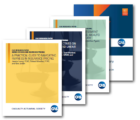Proposed CAS Constitution and Bylaws Amendments to Allow Five-Year Associates the Right to Vote
With recent CAS membership surveys demonstrating growing support for voting rights for CAS Associates, the CAS Board of Directors has approved putting the issue to a formal vote of the Fellows. The 2020 CAS elections ballot includes a proposal to amend the CAS Constitution and Bylaws to allow Associates who have been members for at least five years to vote in CAS elections for president-elect and board of directors. In putting the issue on the ballot, the board is recommending that the Fellows vote in favor of the amendments.
The 2018 Quinquennial Survey results indicate that 68% of Fellows responding are in favor of allowing Associates to vote in CAS elections. This continues an increasing trend from 48% in 2008 and 62% in 2013, and now exceeds the required two-thirds approval necessary for amending the Constitution and Bylaws. A 2019 Member Advisory Panel survey shows similar levels of support.
The CAS currently has 3,364 Associates among its 9,217 members. If the amendments are approved, 1,475 Associates who have held their designations for at least five years (44% of current ACAS), would be eligible to vote. Reasons for approving the amendments include:
- Despite paying full dues, Associates lack true representation within the CAS. It is important and beneficial to the CAS to include the views of all members in the governance processes that have a direct impact on their abilities to practice.
- Many of the “career Associates” provide a high level of volunteer service to the CAS, yet, according to comments submitted through the surveys, the lack of a vote makes some ACAS feel disenfranchised.
- Voting rights have not changed since the inception of the CAS, a period when there was a much clearer distinction between Fellows and Associates. While many Fellows view Associateship as a stepping-stone toward full recognition and not an end in and of itself, this view does not recognize the many changes that have significantly narrowed the differences between Associates and Fellows, particularly regarding practice rights.
- Among actuarial organizations in North America, both the Society of Actuaries and Canadian Institute of Actuaries allow Associates the right to vote five full years after becoming Associates.
Please refer to the marked-up versions of the CAS Constitution and Bylaws to review the proposed changes to the governing documents.
Constitution and Bylaws changes require an affirmative vote from 10% of the Fellows or two-thirds of the Fellows voting, whichever is greater.
Wording of Ballot Question for Proposed Changes to the CAS Constitution and Bylaws:
“Do you approve the Constitution and Bylaws changes allowing Associates to vote in CAS elections for President-Elect and Board of Directors (i.e., to become Voting Members of the CAS) five years after they are recognized as Associates?”
- Yes or No
Proposed Amendments to the CAS Constitution and Bylaws
Constitution and Bylaws changes require an affirmative vote from 10% of the Fellows or two-thirds of the Fellows voting, whichever is greater. CAS Fellows will be invited to cast online ballots on the Constitution and Bylaws amendments in conjunction with the elections for president-elect and board of directors beginning on August 3, 2020. The deadline for voting is August 31, 2020.
The following shows changes to only the affected sections of the CAS Constitution and Bylaws. To view the full CAS Constitution and Bylaws with marked changes, visit https://www.casact.org/press/index.cfm?fa=viewArticle&articleID=4733.
CAS Constitution
(As Amended September 5, 2013xx, xxxx)
ARTICLE III. — Membership
Section 1.—Classes of Members
The membership of the Casualty Actuarial Society shall be composed of three classes:
a) Fellows
The Fellows of the Society shall be the present Fellows and those who may be duly admitted to Fellowship as hereinafter provided. Fellows shall be eligible to vote,Voting Members of the Society and shall also be eligible to hold office, make nominations, and generally exercise the rights of full membership. Fellows are authorized to append to their names the initials F.C.A.S.
b) Associates
The Associates shall be the present Associates and those who may be duly admitted to Associateship as hereinafter provided. Associates shall be entitled to attend meetings of the Casualty Actuarial Society and to participate at Society functions. Five years after becoming an Associate (or upon becoming a Fellow, whichever occurs first), an Associate shall become a Voting Member of the Society. Members who have been Associates for five years as of any date on or after the date of adoption of this provision will then immediately become Voting Members. Associates are authorized to append to their names the initials A.C.A.S.
…
ARTICLE IV. — Officers
…
Section 2.—Election and Term of Office
At the close of the annual meeting, the President-Elect shall assume the office of President for a term of one year. Annually, a new President-Elect shall be elected by the FellowsVoting Members in a secret ballot for a term of one year. Before the close of the annual meeting, the Board of Directors shall, by majority vote of the Directors present and voting, elect the Vice Presidents for a term of one year.
…
Section 4. Removal from Office
The process for the removal from office of the President-Elect or President can be initiated by either a petition of 5% of the FellowsVoting Members, a two-thirds majority vote of the Officers of the CAS (with the person proposed to be removed not voting), or a majority vote of the Board of Directors (with the person proposed to be removed not voting). Reasons for the removal include: violation of the code of conduct; abuse of power; behavior materially incompatible with the proper function and purpose of the office.
Procedures relating to the removal process shall be adopted by the Board. Once the removal process has been initiated, a hearing and vote of the Board will be held within 45 days. A vote to recommend removal requires a two-thirds majority of the Board members voting (with the person proposed to be removed not voting). A Board recommendation for removal shall be subject to approval by a vote of the Voting MembersFellows, to be held within 45 days of the Board vote. A two-thirds majority of the Voting MembersFellows voting is required for removal.
ARTICLE V. — Board of Directors
…
Section 2.—Election and Term of Office
Annually, in a secret ballot of the Voting MembersFellows, four Fellows shall be elected to the Board of Directors for a term of three years. A retiring elected Director shall not be eligible for reelection for at least one year after the expiration of the term for which the Director was elected. Appointed Directors will be elected by the Board of Directors and will serve a term of one year, renewable for up to three years.
…
Section 4. Removal from Office
The process for the removal from the Board of the immediate past President or any elected Director can be initiated by either a petition of 5% of the Voting MembersFellows, a two-thirds majority vote of the Officers of the CAS (with the person proposed to be removed not voting), or a majority vote of the Board of Directors (with the person proposed to be removed not voting). Reasons for the removal include: violation of the code of conduct; abuse of power; behavior materially incompatible with the proper function and purpose of the office.
Procedures relating to the removal process shall be adopted by the Board. Once the removal process has been initiated, a hearing and vote of the Board will be held within 45 days. A vote to recommend removal requires a two-thirds majority of the Board members voting (with the person proposed to be removed not voting). A Board recommendation for removal shall be subject to approval by a vote of the Voting MembersFellows, to be held within 45 days of the Board vote. A two-thirds majority of the Voting MembersFellows voting is required for removal.
…
ARTICLE VII. — Meetings
There shall be an annual meeting of the Society on such date in the last quarter of each calendar year as may be fixed by the Board of Directors, but other Society meetings may be called by the Board from time to time and shall be called by the President at any time upon the written request of 5% of the Voting MembersFellows. At least two weeks notice of all Society meetings shall be given to the members. At Society meetings, the presiding officer shall vote only in case of a tie.
ARTICLE VIII. — Quorum
A majority of the members of the Board of Directors shall constitute a quorum. Five percent of the Voting MembersFellows of the Society shall constitute a quorum at every meeting of the Society.
CAS Bylaws
(As Amended August 30, 2019xx, xxxx)
…
ARTICLE V. — Elections and Filling of Vacancies
Procedures for nominations and elections shall be established by a majority vote of the Directors present and voting at a meeting of the Board of Directors. These procedures shall be provided to the membership annually at the beginning of the election process. A majority of the votes cast by Voting Members Fellows shall be necessary for the election of the President-Elect. For the election of Directors, the four candidates with the highest number of votes cast shall be elected, subject to a requirement that one-third of the valid ballots cast for Director shall be necessary for the election of a Director.
The Board of Directors may fill vacancies in the term of any Officer or member of the Board. Any Officer so appointed shall serve until the next annual meeting. Any member of the Board so appointed shall serve, subject to ratification by the Voting Members Fellows at the next meeting of the Society, until the expiration of the term of office of the Board member being replaced.











